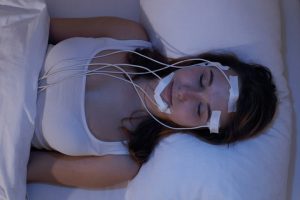New research indicates that lower proportions of certain sleep stages are associated with reduced brain volume in regions vulnerable to the development of Alzheimer’s disease over time. The results show that individuals with lower proportions of time spent in deep sleep and rapid eye movement sleep had lower volumes in critical brain regions, particularly in the lower parietal region, which is known to undergo early structural changes in Alzheimer’s disease. The results were adjusted for possible confounding factors such as demographic characteristics, smoking habits, alcohol consumption, high blood pressure and coronary heart disease.
“Our results provide initial evidence that decreased neuroactivity during sleep can contribute to brain atrophy and thus possibly increase the risk of Alzheimer’s disease,” said lead author Gawon Cho, who has a doctorate in public health and is a postdoctoral fellow at Yale School of Medicine in New Haven, Connecticut. These findings are particularly significant because they help characterize how sleep deprivation, a widespread disorder among middle-aged and older adults, may be related to the pathogenesis of Alzheimer’s disease and cognitive impairment. The study was published in the Journal of Clinical Sleep Medicine, the official publication of the American Academy of Sleep Medicine.
Connection Between Sleep and Long-Term Brain Health
According to the Alzheimer’s Association, Alzheimer’s disease is a degenerative brain disease and the leading cause of dementia. Alzheimer’s is the primary cause of cognitive decline in older adults and is responsible for about 70% of dementia cases. Lack of sleep is a common symptom of the disease and a driving force that can accelerate the progression of the disease. The study included an analysis of data from 270 participants with a mean age of 61 years. 53 percent were female, and all participants were white. Individuals who had already suffered a stroke, were likely to have dementia, or had other significant brain diseases were excluded from the analysis. The study used polysomnography to assess sleep architecture at baseline. Advanced neuroimaging techniques were used to measure brain volume 13 to 17 years later.

Both Short and Long Sleepers Have an Increased Risk of Alzheimer’s Disease
A multi-year study of older adults found that both short and long sleepers experienced more cognitive decline than people who slept a moderate amount, even when accounting for the effects of early-onset Alzheimer’s disease. The study was led by researchers at Washington University School of Medicine in St. Louis. Poor sleep and Alzheimer’s disease are both associated with cognitive decline, and it has proven difficult to separate the effects of the two. By observing the cognitive function of a large group of older adults over several years and analyzing this function in comparison to levels of Alzheimer-related proteins and measurements of brain activity during sleep, the researchers were able to generate crucial data that helps to untangle the complicated relationship between sleep, Alzheimer’s and cognitive function.
The study suggests, according to the researchers, that there is a middle range, or “sweet spot,” for total sleep time at which cognitive performance was stable over time. Short and long sleep times were associated with poorer cognitive performance, possibly due to insufficient sleep or poor sleep quality. One unanswered question is whether it would be possible to intervene to improve sleep, for example by increasing the sleep time for short sleepers by about an hour. Would this have a positive effect on their cognitive performance, preventing it from declining? To answer this question, more longitudinal data is needed.
Research has already shown that both short and long sleepers who self-identify as such are more likely to perform poorly on cognitive tests, but such sleep studies typically do not include research on Alzheimer’s disease. To examine the separate effects of sleep and Alzheimer‘s on cognition, first author Brendan Lucey, MD, an associate professor of neurology and director of the Washington University Sleep Medicine Center, and his colleagues turned to volunteers participating in Alzheimer’s studies through the university’s Charles F. and Joanne Knight Alzheimer’s Disease Research Center. These volunteers undergo annual clinical and cognitive exams and provide a blood sample that is tested for the APOE4 high-risk genetic variant for Alzheimer’s. For this study, participants also provided samples of cerebrospinal fluid to measure levels of Alzheimer proteins, and each slept for four to six nights with a tiny electroencephalogram (EEG) monitor strapped to their forehead to measure brain activity during sleep.
Sleep Quality May be Crucial, Not Just Total Sleep Time
In total, the researchers obtained sleep and Alzheimer’s data from 100 participants whose cognitive function had been monitored for an average of four and a half years. Most (88) had no cognitive impairment, 11 were very mildly impaired, and one had mild cognitive impairment. The average age at the time of the sleep study was 75. Researchers found a U-shaped relationship between sleep and cognitive decline. Overall, cognitive scores declined for those sleeping less than 4.5 or more than 6.5 hours per night, as measured by EEG, while scores remained stable for those in the middle of the range. EEG tends to provide estimates of sleep time that are about an hour less than self-reported sleep time, so the results correspond to 5.5 to 7.5 hours of self-reported sleep, according to Lucey.







